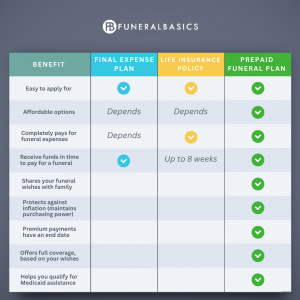
If you’re reading this, then you understand how important it is to prepare for the future. You know that taking out an insurance policy to cover the cost of a funeral is the loving thing to do. The question now is, “Which funeral insurance option is the best for your situation and needs?” Today, we’re going to discuss the three main types of funeral insurance: 1) prepaid funeral plan, 2) life insurance policy, and 3) final expense plan. By looking at each one in-depth, you can determine which is right for you.
A Brief Overview
Before we look at each option more closely, here’s a quick breakdown of the benefits of each option.
Option #1 – Prepaid Funeral Plan
As you can see, the prepaid funeral plan (or prepaid funeral insurance policy) is the frontrunner. Because the policy amount is based on your funeral preferences, you will sit down with a trusted funeral professional to record your wishes. By doing so, you not only communicate your preferences to your family, but you also have the ability to better control the overall cost.
Generally, a prepaid funeral insurance policy is easy to qualify for. You must answer a few basic medical questions, but even if you are in poor health, graded benefit options may be available.
Once you have recorded your preferences, the funeral professional will draw up an itemized list to give you an exact cost. If you approve, you can either pay for the policy in full or set up a payment plan. The premiums for a fully insured policy include the cost of the funeral plus insurance coverage that ensures that even if you die before the prepaid funeral plan is paid up, the full cost of your funeral will be covered from day 1. From that point, you will only pay premiums until your policy is paid in full or until death occurs. And if you move, your policy goes with you.
Here are a few additional benefits to consider.
- Prepaid funeral insurance policies are set up to grow over time, protecting your funeral funds against inflation.
- Some funeral providers offer guarantees on their prices, effectively locking in the cost of the funeral when the plan is set up.
- A properly structured prepaid funeral plan can be considered an exempt asset for Medicaid, if needed.
If you’d like to learn more about recording your wishes, please read “What to Expect at a Preplanning Appointment.”
Option #2 – Life Insurance Policy
Next, let’s take a look at life insurance policies. It is very common to use life insurance funds to pay for funeral expenses. However, it’s important to realize that life insurance funds are often not available immediately. Sometimes, it can take up to 8 weeks to receive funds – long after the funeral is complete.
If the funeral home you partner with works with a life insurance assignment company, they may be able to help you access your funds more quickly. That said, if you do plan to use a life insurance policy and want your family to have quicker access, make sure to choose a funeral home that offers this service.
A few more things to note if you plan to use a life insurance policy for funeral needs.
- Make sure that you apply for a life insurance policy well in advance. The older you are, the harder it is to qualify and the higher your monthly payments. If you are in poor health, coverage may be limited or not available at all.
- Life insurance funds don’t accrue interest, so as inflation rises, your purchasing power decreases.
- Make sure to take out a large enough policy to cover everything your family may need. For example, a prepaid funeral plan is solely intended to pay for funeral expenses. However, a life insurance policy is meant to help with other things. For example, paying off debt, replacing an income, or paying for childcare when a surviving spouse goes back to work. If your policy amount isn’t high enough, your family may not have as much financial support after your death as you intended.
If you’d like more information about using a life insurance policy to pay for a funeral, you can speak with a trusted funeral professional or click here.
Option #3 – Final Expense Plan
Finally, let’s take a look at final expense plans. This type of plan focuses on setting aside funds for funeral expenses or outstanding bills after death. Of the three insurance options, final expense plans are the easiest to qualify for.
However, there are a few things to note before you choose this option.
- Final expense plans offer lower coverage (often not more than $35K). If you have medical bills or significant debt, this option may not go far in helping your family.
- The older you are when you sign up, the higher your monthly premiums. For senior adults on a fixed income, it may be difficult to pay the premiums.
- There’s no end date to payments; they will continue until death.
- Like a life insurance policy, a final expense plan does not account for inflation.
If you’d like more information about final expense plans, click here or stop by a local funeral home you trust. They can give you a sense of how using a final expense plan has worked for other families.
Consider the Pros and Cons of Each Insurance Option
No matter which you choose, there are going to be risks and benefits. Consider your personal situation and then choose the one that best meets your needs. In fact, if you aren’t sure if you’d qualify for your first choice, go speak with a professional. They can give you the details, and you may be surprised at what you qualify for!

































































